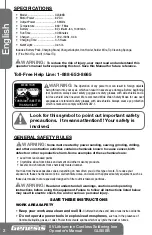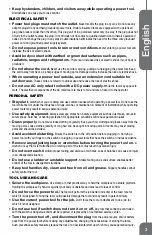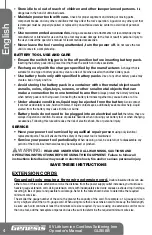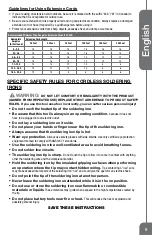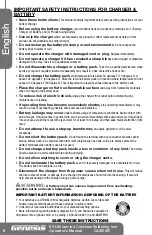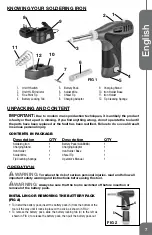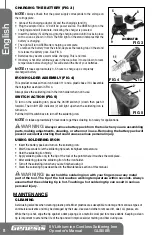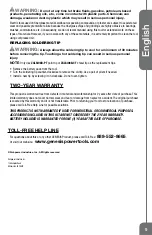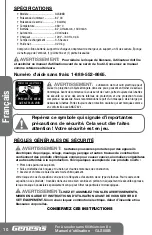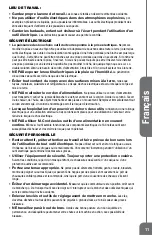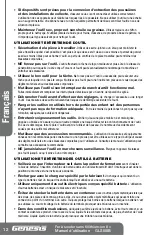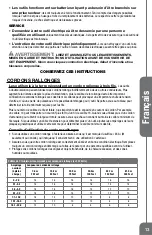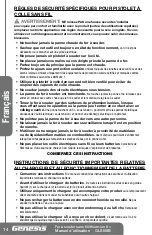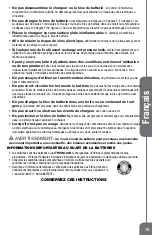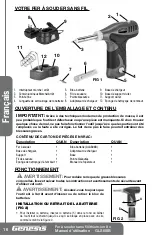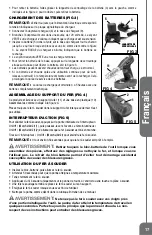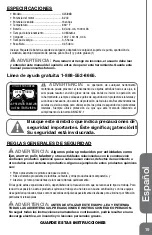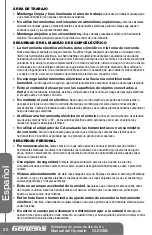
5
English
Guidelines for Using Extension Cords
• If you are using an extension cord outdoors, be sure it is marked with the suffix “W-A” (“W” in Canada) to
indicate that it is acceptable for outdoor use.
• Be sure your extension cord is properly wired and in good electrical condition. Always replace a damaged
extension cord or have it repaired by a qualified person before using it.
• Protect your extension cords from sharp objects, excessive heat, and damp or wet areas.
SPECIFIC SAFETY rULES FOr COrDLESS SOLDErING
IrONS
WArNING:
DO NOT LET COMFOrT Or FAMILIArITY WITH THE PrODUCT
(GAINED FrOM rEPEATED USE) rEPLACE STrICT ADHErENCE TO PrODUCT SAFETY
rULES. If you use this tool unsafe or incorrectly, you can suffer serious personal injury!
•
Do not touch the heated tip of the soldering iron
.
•
Be aware that this tool is always in an operating condition,
because it does not
have to be plugged into an electric outlet.
•
Do not lay a soldering iron on its side
.
•
Do not place your hands or fingers near the tip of the soldering iron.
•
Always assume that the soldering iron tip is hot
.
•
Wear eye protection.
Always use safety glasses with side shields. use only certified eye protection
equipment marked to comply with ANSI z87.1 standards.
•
Use the soldering iron in a well-ventilated area to avoid breathing fumes.
•
Do not solder live circuits
.
•
The soldering iron tip is sharp.
Do not touch the tip or allow it to come in contact with anything
other than soldering wire and the workpiece material.
•
Hold the soldering iron by the insulated gripping surfaces when performing
an operation where the tip may contact hidden wiring.
Tips contacting a “live” wire
may make exposed metal parts of the soldering iron “live” and could give the operator an electric shock.
•
Do not point the tip of the soldering iron at another person.
•
Never leave the soldering iron unattended while it is in the on position.
•
Do not use or store the soldering iron near flammable or combustible
materials or liquids
. These materials may ignite when exposed to the high temperatures created by
the tip.
•
Do not place battery tools near fire or heat
.
This will reduce the risk of explosion and
possibly personal injury.
SAVE THESE INSTRUCTIONS
Recommended Minimum Wire Gauge for Extension Cords (120 Volt)
Nameplate
Amperes
(At Full Load)
Extension Cord Length
25 Feet
50 Feet
75 Feet
100 Feet
150 Feet
200 Feet
0–2.0
18
18
18
18
16
16
2.1–3.4
18
18
18
16
14
14
3.5–5.0
18
18
16
14
12
12
5.1–7.0
18
16
14
12
12
10
7.1–12.0
18
14
12
10
8
8
12.1–16.0
14
12
10
10
8
6
16.1–20.0
12
10
8
8
6
6


